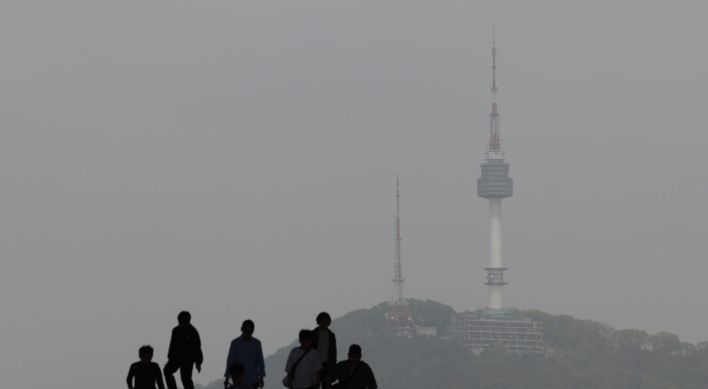Battles in Seoul, Gyeonggi set to be decisive in April 11 polls
The following is the first in a series of articles on the April 11 general elections. ― Ed.
Korea’s two main political parties are neck-and-neck in the contest for control of the 300-seat parliament in next month’s election.
With the showdown less than two weeks away, opinion polls place the rivals ― the conservative ruling Saenuri Party and the liberal Democratic United Party ― within the margin of error apart.
Political experts say whichever party wins, the outcome is certain to tilt the balance of power in the new parliament to the left, with liberals having a much bigger presence.
Yoon Hee-woon, a senior fellow of the Korea Society Opinion Institute, said the DUP should be able to win around 130 seats. But whether it will be able to become the No. 1 party is still anybody’s guess.
“Both parties should be able to win around 130 seats. Whichever comes closer to 140 will be the winner,” said Yoon, adding that the race is too close to call.

The following is the first in a series of articles on the April 11 general elections. ― Ed.
Korea’s two main political parties are neck-and-neck in the contest for control of the 300-seat parliament in next month’s election.
With the showdown less than two weeks away, opinion polls place the rivals ― the conservative ruling Saenuri Party and the liberal Democratic United Party ― within the margin of error apart.
Political experts say whichever party wins, the outcome is certain to tilt the balance of power in the new parliament to the left, with liberals having a much bigger presence.
Yoon Hee-woon, a senior fellow of the Korea Society Opinion Institute, said the DUP should be able to win around 130 seats. But whether it will be able to become the No. 1 party is still anybody’s guess.
“Both parties should be able to win around 130 seats. Whichever comes closer to 140 will be the winner,” said Yoon, adding that the race is too close to call.


For the past four years, President Lee Myung-bak and his Saenuri Party have had control over the parliament, having secured 153 seats of the then-299-member house in the previous election. The largest opposition party was the Democratic Party, now the Democratic United Party, with 83 seats.
In the upcoming April 11 election, however, the liberals are on course to bag far more seats, given the strong public dissatisfaction with Lee and accusations of corruption within the Saenuri Party.
Another factor boosting their chances is the election alliance formed between the DUP and the far-left Unified Progressive Party. The two parties joined forces to eject the ruling party from power, fielding nearly 70 joint candidates.
A media poll released Thursday pointed to a tight race between the Saenuri Party and the DUP. It showed that the Saenuri Party had bounced back in support while the DUP stumbled after an early lead.
In the survey, commissioned by local broadcaster KBS, the Saenuri Party was leading the DUP 26.7 percent to 24.3 percent, which was within the margin of error.
In the same poll conducted a month ago, Saenuri garnered support of 21.7 percent against the DUP’s 23.4 percent.
“Opposition parties usually have an advantage in elections taking place near the end of an administration. But the situation for the past month was to the contrary,” Yoon explained.
While Saenuri Party chairwoman Park Geun-hye has managed to regain much of the popularity that the party had lost by nominating fresh figures and introducing reforms, the DUP got caught up in conflicts and allegations of irregularities in its processes to select candidates and form an alliance with the UPP, he said.
Other pundits gave mixed predictions for the outcome.
Professor Kang Won-taek of Seoul National University said despite the uptick in Saenuri Party support, the opposition bloc would still be able to eke out a victory, although by a very narrow margin.
He said the DUP was likely to become the largest parliamentary bloc, beating the Saenuri Party by 5 to 10 seats.
Shin Yul of Myungji University offered a different view, forecasting a Saenuri Party victory, again by 5 to 10 seats.
The experts, although they vary in predicting the winner, agreed that races in Seoul and its suburbs will determine the fortunes of rival forces.
Seoul and its surrounding Gyeonggi Province, free from the country’s deep-rooted regionally biased voting patterns, have been considered the key battlegrounds in past elections too.
The April 11 election is seen as a litmus test of voter sentiment as Asia’s fourth largest economy strives to create new momentum for growth through free trade pacts amid a yawning rich-poor gap at home.
It is also largely expected to affect the rival parties’ fortunes in a bigger showdown for the presidency at the end of the year.
By Lee Sun-young (milaya@heraldcorp.com)
-
Articles by Korea Herald




![[Weekender] Korean psyche untangled: Musok](http://res.heraldm.com/phpwas/restmb_idxmake.php?idx=644&simg=/content/image/2024/05/02/20240502050841_0.jpg&u=)



![[Eye Interview] 'If you live to 100, you might as well be happy,' says 88-year-old bestselling essayist](http://res.heraldm.com/phpwas/restmb_idxmake.php?idx=644&simg=/content/image/2024/05/03/20240503050674_0.jpg&u=)









![[Herald Interview] Director of 'Goodbye Earth' aimed to ask how we would face apocalypse](http://res.heraldm.com/phpwas/restmb_idxmake.php?idx=652&simg=/content/image/2024/05/03/20240503050732_0.jpg&u=)
